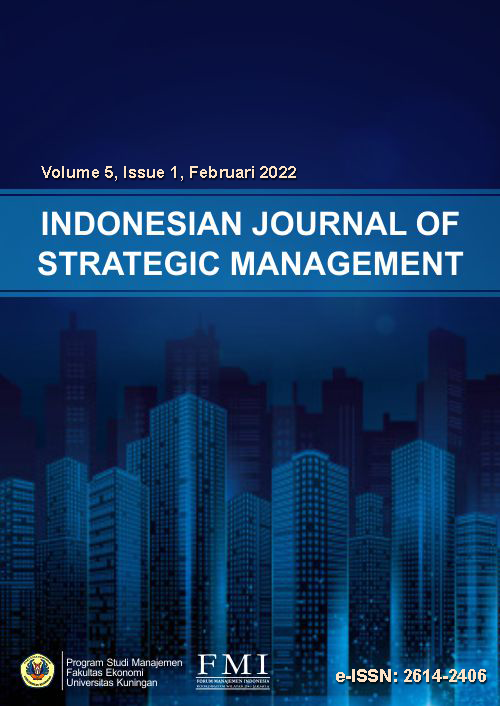A COMPREHENSIVE REVIEW OF WORK-FAMILY BALANCE THEORIES
Abstract
This study offers a thorough analysis of work-family balance theories. Secondary data from books and published articles were used in the investigation. There is no widely acknowledged central paradigm for work-family balance, according to the paper's conclusion. The breadth of the study's framework, variables, or perspectives affects the theories utilized by academics in the subject of work-family balance, which can lead to omissions or overlap in frameworks or constructions. The segmentation, resources, spillover, resource drain, integration, border, and enrichment theories, among others with acceptable descriptions, are the key conceptual frameworks relevant to the work and family domains that are included in this research.
References
Abioro, M. A., Oladejo, D. A., & Ashogbon, F. O. (2018). Work-life balance practices and employees productivity in the Nigerian University system. Grawford Journal of Business & Social Sciences, 8(2), 1-11.
Akinyele, S.T., Peters, M. C., & Akinyele , F. E. (2016). Work-life balance imperatives for modern work organisation: A theoretical perspective. International Journal of Managerial Studies and Research, 4(8), 57-66.
Allen, T. D., Cho, E., Meier, L. L. (2014). Work-family boundary dynamics. Annual Review of Organisational Psychology and Organisational Behaviour, (1), 99-121.
Anyim, F. C., Shadare, O. A., & Adio, L. A. (2020). Work-life balance and employee performance selected insurance companies in Lagos State. Academic Journal of Economics Studies, 6(2), 88-95.
Bello, Z., & Tanko, G. I. (2020). Review of work-life balance theories. GATR Global Journal of Business and Social Science Review, 8(4), 217-227.
Bird, J. (2006). Work-life balance: Doing it right and avoiding the pitfalls. Employment Relations Today, 33(3), 21-30.
Blood, R., & Wolfe, D. (1960). Husbands and wives. New York: Macmillan.
Clark, S. C. (2000). Work-life borders theory: A theory or work-life balance. Human Relations Journal, 5396), 747-770.
Edwards, J. J., & Rothbard, N. P. (2000). Mechanisms linking work and family: clarifying the relationship between work and family constructs. Academy of Management Review, 25(1), 178-199.
Evans, P., & Baetolome, F. (1984). The changing pictures of the relationship between career and family. Journal of Organsiational Behaviour, 5(1), 9-21).
Frone, M. R., Russel, M., & Copper, M. L. (1992). Antecedents and Outcomes of work-family conflicts: Testing a model of the work-family interface. Journal of Applied Psychology, 77,65-78.
Googins, B. K. (1991). Work/family conflict: private lives-public responses. New York: Auburn House.
Gragnano, A., Simbula, S., & Miglioretti, M. (2020). Work-life balance: Weighing the importance of work-family and work-health balance. International Journal of Environmental Research and Public Health, 17(3), 1-20.
Grandey, A. A., & Cropanzano, F. (1999). The conservation of resources model applied to work-family conflict and strain. Journal of Vocational Behaviour, 54, 350-370.
Greenhaus, J., & Beutell, N. (1985). Sources of conflict between work and family roles. Academy of Management Review, 10, 76-88.
Guest, D. E. (2002). Human resource management: When research confronts theory. International Journal of Human Resource Management, 12(2), 22-38.
Khateeb, F. R. (2021). Work-life balance: A review of theories, definitions and policies. Cross-Cultural Management Journal, 23(1), 1-29.
Lambert, S. J. (1990). Processes linking work and family: A critical review and research agenda. Human Relations, 43(3), 239-257.
Marks, S. R. (1977). Multiple roles and role string: Some notes on human energy, time and commitment. American Sociological Review, 41, 921-936.
Morris, M. L., & Madsen, S. R. (2007).Advancing work-life integration in Individuals, organisations and communities. Advances in Developing Human Resources, 9(4), 439-454.
Osoian, C., Lazar, I., & Ratiu, P. (2010). The role of work-life balance practices in order to improve organisational performance. European Research Studies Journal, 3(1), 201-214.
Piokrkowski, C. S. (1979). Work and the family system: A naturalistic of working-class and lower-middle-class families. New York: Free press.
Rincy, V. M., & Panchanatham, N. (2014). Work-life balance: A short review of the theoretical and contemporary concepts. Continental Journal of Social Sciences, 7(1), 1-24.
Saltzstein, A., Ting, V., & Saltzstein, G. (2001). Work-life balance and job satisfaction: The impact of family-friendly policies on attitudes of federal government employees. Journal of Public Administration Review, 61(4), 452-467.
Sieber, S. D. (1974). Towards the theory of role accumulation. American Sociologic Review, 34, 567-578.
Zedeck, S. (1992). Exploring the domain of work and family concerns. In S. Zedeck (ed). Work, families and organisations. San Francisco: Jossey. Bass, 1-476.
Zedeck, S., & Mosier, K.L. (1990). Work in the family and employing organisation. American psychologist, 45(2), 238-245.

